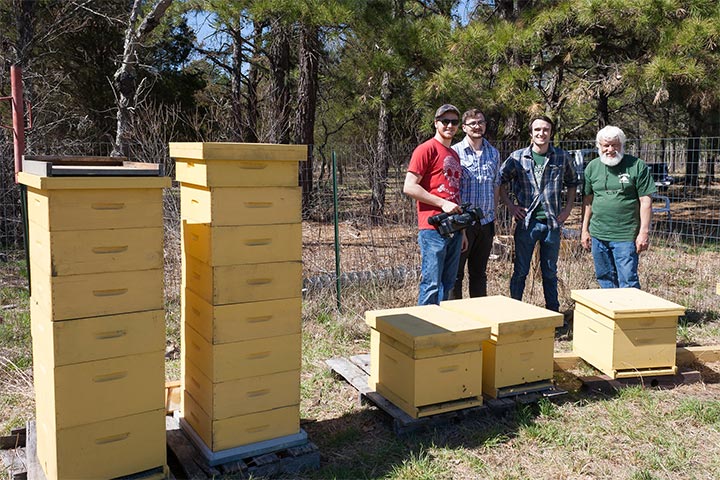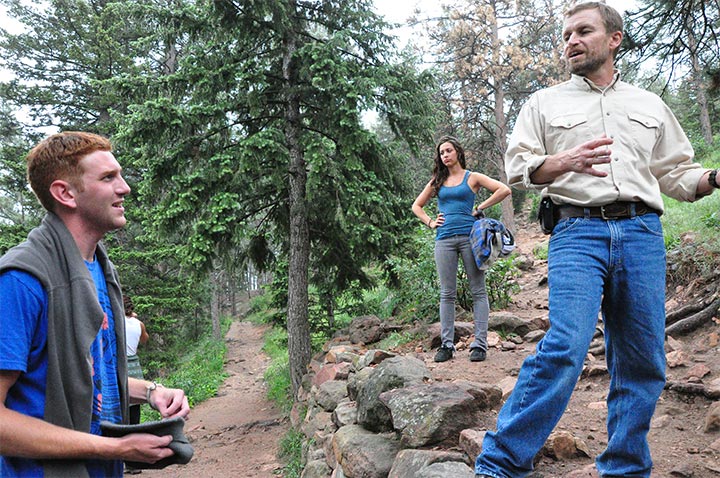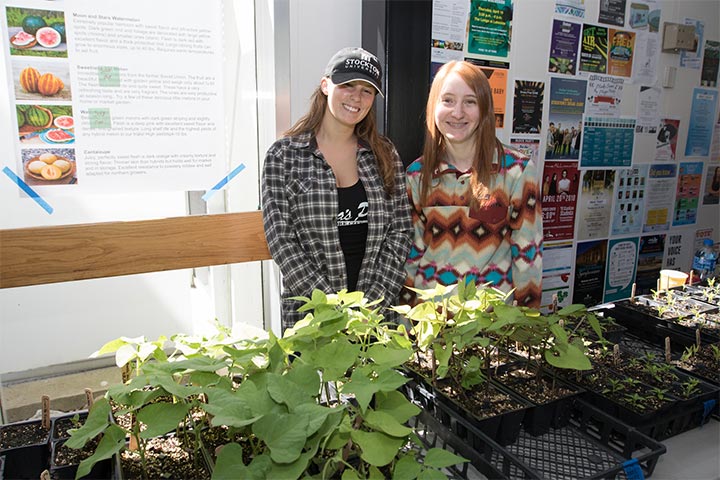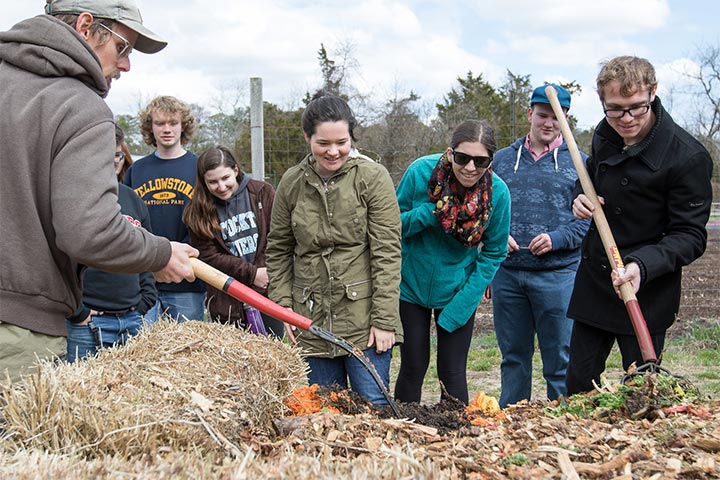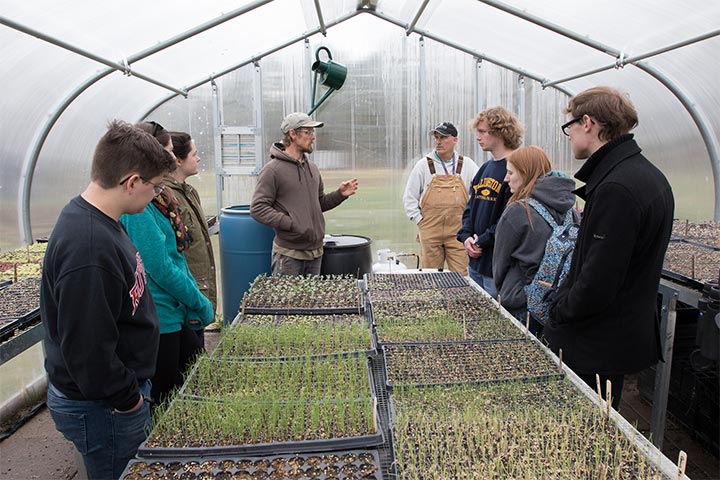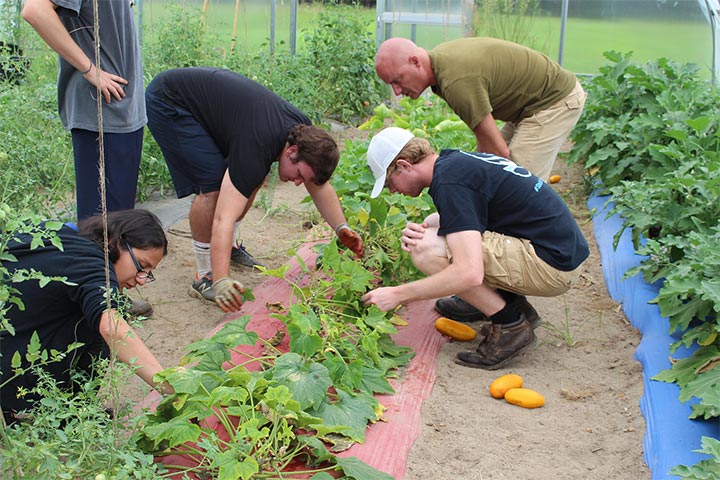Sustainability - Agroecology
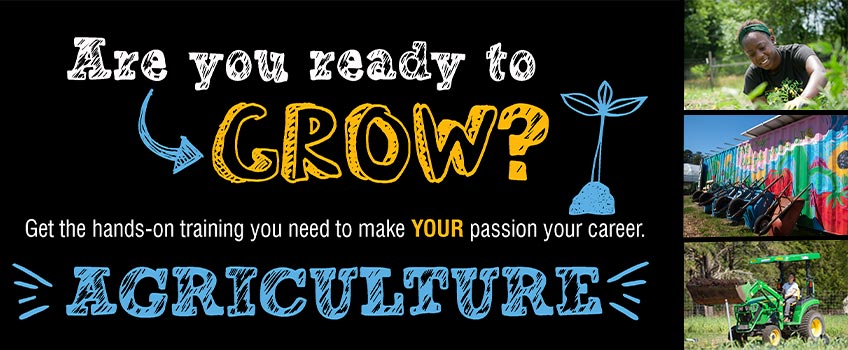
Student Video Testimonials
What is the Agroecology concentration?
The way we currently produce food is linked to water and air pollution, soil degradation, water scarcity, public health threats, and climate change. It’s can’t continue. So, just as we cannot continue business as usual with a reliance on fossil fuels, inefficient buildings, or ineffective public policy, we need to reimagine the agricultural sector. As a result of this, demand for healthy, delicious, organic and locally produced foods are seeing large increases year over year. And new ways of transitioning agriculture from a source of climate-changing emissions to a solution for climate change, and a net sink for greenhouse gasses, are being developed and implemented. This new perspective requires that we re-connect the way we grow food with the broader need for a balanced and stable ecological system; we need to re-think agriculture as an integral part of a local and global ecological balance, and that’s the idea of Agroecology. The study of agroecology looks to use sustainable and ecological principals to grow crops. Agroecology also seeks to transform the food system in a just and sustainable way; not just how we grow it, but how we harvest, process, transport, and prepare food. The aim is to address climate change and other environmental threats, and also to make food healthier and more available, to help address hunger and food scarcity, while also producing delicious and healthy food for everyone.
At Stockton, our curriculum focuses on Market Garden agriculture—a way of growing high yield crops, distributed locally, on a small amount of land. Students in this concentration generally focus on crop production, food systems, and energy use, among other areas. All students will enjoy experience, both in class and independent study, on the campus Sustainability Farm, a small farm on campus.
What sorts of courses do Agroecology students take?
Like all sustainability students, students focused in Agroecology will take core courses in Ecological Economics, Sustainable Technology and Environmental Policy and Law. And students will complete a set of introductory courses in Biology, Ecology, and other sciences. The core courses in the major are Food and Agriculture (SUST 3440/3445) and Plants and Agroecology (SUST 3450/3455). Both courses include a hands-on lab component on the farm. These courses will give you a foundation in sustainable farming practice, in food systems, and in farming practice. Students can also take Farm Experiential (SUST 2801) at any time to gain more hands-on experience and training on the Sustainability Farm. Agroecology Practicum (SUST 3461) is generally taken in the junior or senior year, as a more focused training experience in agriculture. This course offers an in-depth study of agroecology practices and may involve a semester long project in the area of interest to the student.
In addition, students can pick electives that offer additional perspectives on food systems, from HYDROPONICS to MARINE FISHERIES to INTEGRATIVE HEALTH. This allows students to develop a more focused area of expertise, and gain a valuable broader perspective.
At the completion of the program, students should have the experience, training, and knowledge to help shape a more sustainable system of agriculture as a farmer, advocate, educator, or manager.
How long does it take to complete the Agroecology concentration?
That depends on your preparation. If you come to Stockton as a freshman with some basic science courses, you can complete the degree in four years with no trouble. But, if your math background isn’t quite as solid, and you haven’t yet taken science course, that doesn’t mean Agroecology isn’t right for you! It just means you may need to take a couple of courses to get up so speed.
If you’re transferring from community college, and you’ve completed an associate’s degree that included calculus, and had some biology courses, you should be able to graduate in two years of focused study. If you haven’t yet taken the core science courses, it may take a bit longer. That may mean a bit more effort, or a couple of summer course. But, either way, we’ll get you where you need to be!
Agroecology is more than just growing crops. It includes innovative farming methods that help ensure healthy soil, identify new sustainable crops, reduce climate change by trapping carbon in soil, recycle vital nutrients, create year-round production possibilities, promote local farming, and reduce energy use and pollution in farming.
What kind of job can an Agroecology concentration get you?
Farming is one of the main fields that our students find employment in after graduation. This can involve working on a farm or in industries that support farmers. Many of our graduates start as managers at regional farms after graduation, with the intent of one day starting their own farm. Others find work in agrotourism, an area that has experienced tremendous growth in the last few years. This can include regional wineries, breweries, and community-supported projects. There are also jobs in plant propagation and food distribution.
In fact, the careers of Agroecology studies are probably more varied than you realize. You can find Stockton graduates at many of the farmers markets in the area. Our graduates find work in managing farmer’s markets, in municipal and community gardens, and in urban agriculture. They also find jobs working to shape better food systems, in community development, urban food networks, and food security and advocacy. There is a rising effort to address food insecurity in New Jersey and nationally, and a growing number of organizations and local authorities are taking up the challenge, from direct food assistance to local gardening to political action. The Food Democracy Collaborative at Stockton University [link!!] offers students a hands-on opportunity to engage these challenges and gain valuable experience. Nonprofits involved in food systems, hunger, and farming are a good place to find employment.
Graduates can also find jobs working in a field that supports agriculture. Both the federal and state departments of agriculture nearly always have openings in jobs that support farmers. Of course, students can also continue their education by going on to graduate school doing agricultural research.
What are the career prospects with an Agroecology focus?
This is a great time to get into the sustainable agriculture area. There is expanding interest in combating climate change using agricultural practices, including practices like expanding cover crops and storing carbon in the soil. So there is an anticipated need for educators, practitioners and researchers to help develop and promote these new farming methods. Small scale farming, or market garden farming, is expanding rapidly thanks to the efforts of a growing number of younger, beginning farmers. With the growing demand for local produce, increasing number of farmers markets, and expanding network of food advocates, it’s an exciting time for this new generation of young farmers. Consumers now appreciate, even demand, locally grown food that is produced sustainably. Organic food has experienced double digit growth for a large number of years now, and the food system as a whole is on the verge of major changes in the coming years. The Agroecology concentration will give you the knowledge necessary to thrive in a job in the modern food system.
Additional Information
For more information on the Agroecology concentration and the sorts of careers available to this profession, contact:

Dr. Patrick R. Hossay
Professor of Sustainability
HSC - 101 | 609-652-4303
Patrick.Hossay@stockton.edu

Dr. Ron S. Hutchison
Associate Professor of Sustainability
USC2 - 309 | 609-652-4727
Ron.Hutchison@stockton.edu
